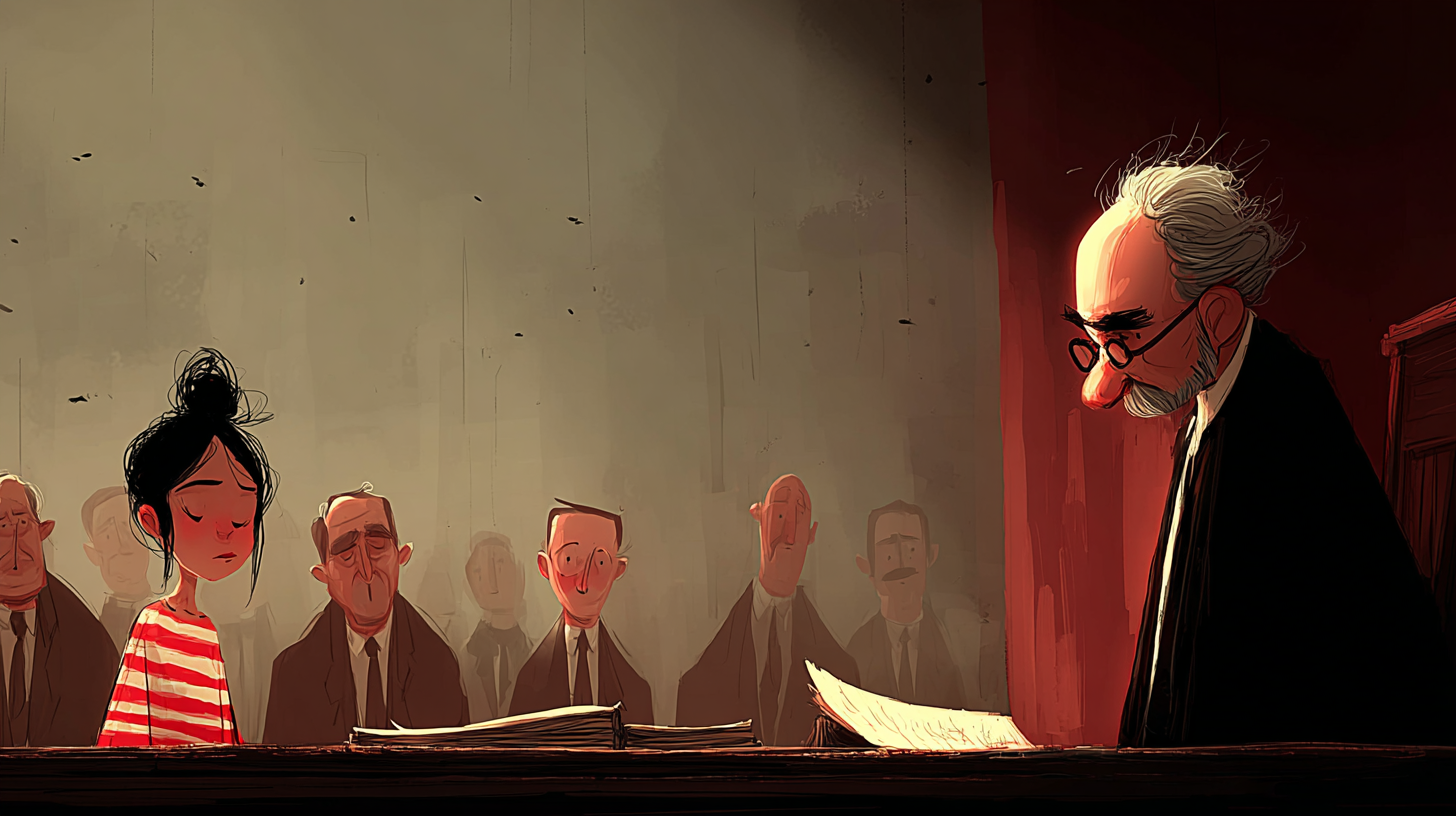A sentence means “a group of words” or “a punishment given by a judge.”
「sentence」は「文」や「判決」という意味。
以下は英単語 “sentence” に関するストーリー型学習コンテンツです。まずは大枠の意味を理解して最後の文章で確認しましょう。
主な意味(main meaning)
| 品詞 | 意味 | 発音 (IPA) | 例文 |
|---|---|---|---|
| 名詞 | 文 | /ˈsen.təns/ | She wrote a long sentence in her notebook. |
| 名詞 | 判決(刑罰) | /ˈsen.təns/ | The judge gave him a five-year sentence. |
| 動詞 | 判決を下す | /ˈsen.təns/ | He was sentenced to prison for his crime. |
語源(etymology)
ラテン語「sententia」(意見、思考)から来ていて、そこから「文」「判決」の意味に広がった。
核イメージは「はっきりとした考えをまとめたもの」。
類義語(synonyms)
| 類義語 | 意味 | 例文 |
|---|---|---|
| statement | 発言、文章 | He made a clear statement about the problem. |
| judgment | 裁き、判断 | The court’s judgment was final. |
| phrase | 句、言い回し | She used a polite phrase in her email. |
| verdict | 評決 | The jury gave a guilty verdict. |
反義語(antonyms)
| 反義語 | 意味 | 例文 |
|---|---|---|
| question | 質問 | He asked a simple question instead of making a sentence. |
| acquittal | 無罪判決 | The man received an acquittal and was free to go. |
コロケーション(collocations)
| コロケーション | 例文 |
|---|---|
| complete sentence | Please write a complete sentence in your answer. |
| prison sentence | He is serving a ten-year prison sentence. |
| death sentence | The criminal was given the death sentence. |
| short sentence | She wrote a short sentence on the board. |
2項表現(binomials)
| 2項表現 | 例文 |
|---|---|
| life and sentence | The life and sentence of the writer are studied in school. |
| words and sentences | Language is made of words and sentences. |
英語ストーリー(english story)
The Trial and the Sentence
It was a cold morning when Michael entered the courthouse. He had been accused of stealing from a local store. The atmosphere was heavy, and every word spoken in the courtroom felt like a complete sentence, carrying weight and meaning.
The trial began with the prosecutor making a statement about the case. He said clearly, “The evidence shows that Michael was inside the store at midnight.” The defense lawyer, however, gave another judgment, suggesting that Michael was simply near the store but not inside.
The judge listened carefully to both sides. The jury, made up of ordinary citizens, had the difficult task of deciding the truth. After hours of discussion, they returned to the courtroom. The foreman stood and delivered the verdict: “Guilty.” The word was short, but it carried more power than a long phrase.
Michael’s heart sank. He had hoped for an acquittal, but instead he now faced punishment. The judge looked at him seriously and spoke in a slow, calm voice. “Michael, you are sentenced to three years in prison.” It was a prison sentence, not the death sentence, but it still felt like the end of freedom.
The lawyer whispered to Michael, “At least it is a short sentence compared to what could have happened.” Michael nodded, but his mind was full of fear. He thought about the difference between a question and a sentence. A question opens the door to possibilities, but a sentence closes it with finality.
In the weeks that followed, Michael spent time reflecting on his life. He remembered that language itself is made of words and sentences, just like a court case is made of facts and decisions. Each judgment and each statement builds toward the end, just as words build toward meaning.
One day in prison, Michael decided to write about his experience. He wrote a book that explained the life and sentence of a young man who made mistakes but learned from them. He used many phrases to show his feelings and made sure every line was a complete sentence.
Years later, when he was finally released, people had read his book and were moved by his story. Some even said his writing was more powerful than the judge’s sentence. Michael realized that a sentence could mean punishment, but it could also mean expression. One ends freedom, and the other gives life to ideas.
和訳
裁判と判決
冷たい朝、マイケルは裁判所に入った。彼は地元の店から盗みをしたと告発されていた。法廷の空気は重く、そこで話される一つひとつの言葉が、重みを持つ**complete sentence(完全な文)**のように感じられた。
裁判は検察官の**statement(発言)から始まった。彼ははっきりとこう言った。「証拠は、マイケルが深夜に店の中にいたことを示しています。」一方、弁護士は別のjudgment(判断)**を示し、マイケルは店の近くにいただけで中には入っていないと主張した。
裁判官は両方の意見を注意深く聞いた。陪審員たちは真実を決めるという難しい役目を持っていた。数時間の議論の後、彼らは法廷に戻った。代表者が立ち上がり、**verdict(評決)を述べた。「有罪です。」その言葉は短かったが、長いphrase(句)**よりも力を持っていた。
マイケルの心は沈んだ。彼は**acquittal(無罪判決)を期待していたが、代わりに罰を受けることになった。裁判官は真剣な表情で、ゆっくりとした声で言った。「マイケル、あなたを懲役3年にsentence(判決を下す)します。」それはprison sentence(懲役刑)**であり、**death sentence(死刑)**ではなかったが、それでも自由の終わりのように感じられた。
弁護士はマイケルにささやいた。「もっと重い刑にならなくてよかったよ。これは**short sentence(短い刑期)だ。」マイケルはうなずいたが、心は恐怖でいっぱいだった。彼はquestion(質問)とsentence(文・判決)**の違いについて考えた。質問は可能性への扉を開くが、判決はそれを閉じるのだ。
刑務所に入ってからの数週間、マイケルは自分の人生を振り返った。彼は思い出した。言語は**words and sentences(言葉と文)からできているように、裁判も事実と決定からできているのだ。ひとつひとつのjudgment(判断)やstatement(発言)**が積み重なって結末に至る。ちょうど、言葉が積み重なって意味を作るように。
ある日、マイケルは自分の経験を書くことに決めた。彼は、過ちを犯したがそこから学んだ若者の**life and sentence(人生と刑罰)について本を書いた。彼は多くのphrases(句)を使って気持ちを表現し、すべての行をcomplete sentence(完全な文)**にした。
数年後、ようやく釈放されたとき、人々は彼の本を読み、その物語に心を動かされた。中には「彼の文章は裁判官の**sentence(判決)**よりも強い」と言う人もいた。マイケルは気づいた。sentenceは刑罰を意味することもあれば、表現を意味することもある。ひとつは自由を終わらせ、もうひとつは考えに命を与えるのだ。
Q&A
Q: 「sentence」と「statement」の違いは何ですか?
A: 「sentence」は文法的に一つのまとまった「文」や裁判の「判決」を指します。「statement」は「発言」「声明」で、必ずしも文法的に完全な文でなくてもよく、意見や立場を表すニュアンスが強いです。
Q: 「sentence」と「judgment」の違いは?
A: 「judgment」は「判断」や「裁き」を意味し、裁判だけでなく日常的な「判断力」にも使われます。一方「sentence」は裁判で下される「刑罰の判決」を特に指します。
Q: 「sentence」と「phrase」の違いは?
A: 「phrase」は「句」で、主語と述語を持たない部分的な表現です。「sentence」は主語と述語を持ち、完全な意味を持つ「文」です。
Q: 「sentence」と「verdict」の違いは?
A: 「verdict」は「陪審員の評決」を意味します。「有罪」「無罪」と結論を出すことです。その後に裁判官が下す「刑罰」が「sentence」です。
Q: 「sentence」と「question」の違いは?
A: 「question」は「質問」です。情報を求める表現です。一方「sentence」は「文(肯定文・否定文・疑問文などを含む文全体)」や「判決」を指します。
Q: 「sentence」と「acquittal」の違いは?
A: 「acquittal」は「無罪判決」で、刑罰を受けない決定を意味します。「sentence」は刑罰を与える決定なので、正反対の概念です。
Q: 「sentence」と「prison sentence」の違いは?
A: 「sentence」は広く「判決」を意味します。「prison sentence」はその中でも「懲役刑」という具体的な種類を指します。
Q: 「sentence」と「death sentence」の違いは?
A: 「death sentence」は「死刑判決」という特殊な種類の「sentence」です。
Q: 「sentence」と「complete sentence」の違いは?
A: 「sentence」は文を意味しますが、不完全なものも含み得ます。「complete sentence」は文法的に正しく、主語と述語を持ち、完全な意味を伝える文です。
Q: 「sentence」と「short sentence」の違いは?
A: 「short sentence」は短い文や短い刑期を意味します。「sentence」は文や判決の一般的な表現です。
Q: 「sentence」と「words and sentences」の違いは?
A: 「words and sentences」は「言葉と文」で、言語を構成する基本要素の組み合わせを示します。「sentence」単体は文を指します。
Q: 「sentence」と「life and sentence」の違いは?
A: 「life and sentence」は「人生と刑罰」を並べて対比する表現です。「sentence」だけでは「文」または「判決」を意味します。



コメント